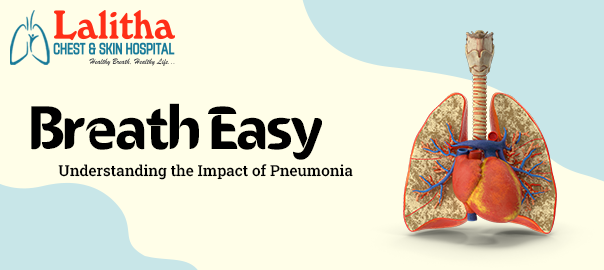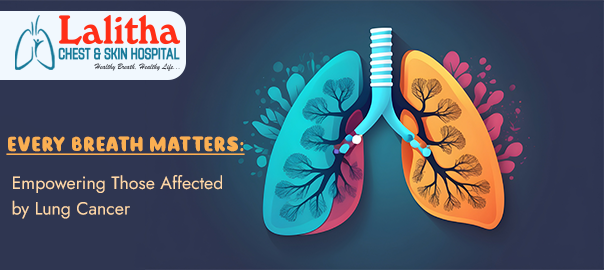Breathe Easy: Understanding the Impact of Pneumonia on Your Lungs
Pneumonia is a common lung infection that can seriously impact respiratory health. It is a respiratory condition inflames the air sacs in one or both lungs, which may fill with fluid or pus, causing symptoms like coughing, fever, chills, and difficulty breathing.
“Whether bacteria, viruses, or fungi cause it, pneumonia requires timely and effective treatment to prevent serious health issues. Untreated pneumonia can lead to severe complications, particularly for individuals with weakened immune systems”, says Pulmonologist Dr. Raj Kumar Korra.
In this blog, with insights from Dr. Raj Kumar Korra at Lalitha Chest and Skin Hospital, we provide complete information about how pneumonia affects the lungs, why timely diagnosis and treatment matter, and how to find the right pulmonologist for pneumonia care.
What happens in Pneumonia?
Pneumonia can cause a range of symptoms that interfere with normal lung function. When infected, the air sacs, or alveoli, become inflamed, disrupting the body’s oxygen exchange process. This inflammation leads to reduced oxygen in the bloodstream, making breathing difficult.
People with pneumonia may experience a persistent cough, chest pain, fatigue, and shortness of breath. In severe cases, especially in individuals with other health conditions, pneumonia can lead to acute respiratory distress or even be life-threatening.
Pneumonia is primarily classified by the type of infection causing the condition:
- Bacterial Pneumonia: Often more severe, this type requires prompt antibiotic treatment.
- Viral Pneumonia: Caused by viruses like the flu or COVID-19, this type usually improves with rest and supportive care but can sometimes need antiviral medications.
- Fungal Pneumonia: This type is more common in people with weakened immune systems and may need specific antifungal treatments.
Treatment Options for Pneumonia
- Antibiotics for Bacterial Pneumonia: If you are diagnosed with bacterial pneumonia, your doctor may prescribe antibiotics for pneumonia treatment. Antibiotics effectively combat the bacteria causing the infection, helping relieve symptoms and reduce the risk of complications. To prevent antibiotic resistance and recurrence, it’s crucial to complete the entire course of antibiotics, even if symptoms improve.
- Viral Pneumonia Treatment: Viral pneumonia usually resolves independently with adequate rest, hydration, and over-the-counter medications to alleviate symptoms like fever and cough. However, some cases of viral pneumonia, especially those caused by influenza or COVID-19, may require antiviral medications or additional care from a healthcare provider.
- Specialized Care for Severe Cases: Hospitalization may be required for individuals with severe symptoms or underlying health conditions. This enables healthcare providers to administer intravenous antibiotics, oxygen therapy, or mechanical ventilation if necessary. A chest hospital in Karimnagar or a similar facility can provide advanced care and monitoring for high-risk patients, ensuring a safe recovery.
Preventing Pneumonia: Tips for Lung Health
Preventing pneumonia is key to maintaining good respiratory health, especially for those at higher risk. Some preventive measures include:
- Vaccination: Vaccines like flu shots and pneumococcal vaccines can reduce the risk of pneumonia.
- Good Hygiene: Regular handwashing and avoiding close contact with sick individuals can help prevent the spread of infections.
- Healthy Lifestyle: Maintaining a healthy immune system through a balanced diet, regular exercise, and adequate sleep supports lung health.
With proactive health measures and specialized care, you can manage and recover from pneumonia, restoring your lung function and breathing easily once again.
Seeking Expert Care:
If you or a loved one is showing signs of pneumonia and need a reliable pulmonologist for quick diagnosis and treatment, consider visiting Lalitha Chest and Skin Hospital in Karimnagar.
Led by Dr. Raj Kumar Korra, one of Karimnagar’s top lung specialists, Lalitha Chest and Skin Hospital combines the latest medical infrastructure with a proven record in treating all types of pneumonia. Dr. Korra’s expertise ensures comprehensive care for all lung-related conditions. To book your appointment, visit our website: lalithachestandskinhospital.com



